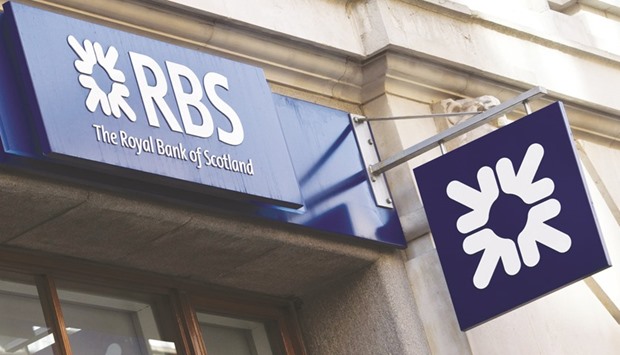Royal Bank of Scotland said yesterday that annual losses more than trebled in 2016 on litigation and restructuring costs, triggering more job cuts and a fresh round of savings.
RBS, bailed-out by the British government following the 2008 financial crisis, posted its ninth consecutive annual losses last year.
Its net loss for 2016 came in at £6.95bn ($8.7bn, €8.2bn), up from a loss after tax of £1.98bn a year earlier, RBS said in a statement.
“There will be job losses that we will have to go through to get this business back into shape,” said chief executive Ross McEwan, who would not be drawn on an exact figure.
The Edinburgh-based lender said it had been hit by litigation and conduct costs of almost £5.9bn, largely over its role in the 2008 US subprime housing crisis.
It suffered also restructuring charges totalling £2.1bn during 2016.
“These costs are a stark reminder of what happens to a bank when things go wrong and you lose focus on the customer, as this bank did before the financial crisis,” added New Zealand national McEwan. RBS is around 73% owned by the British government after the lender was saved with £45.5bn of taxpayers’ cash in the world’s biggest banking bailout at the height of the global financial crisis.
In recent years, McEwan has overseen a massive overhaul of operations, slashing the bank’s investment banking activities and axing tens of thousands of jobs.
RBS said it would slash operating expenses by a further £2bn over four years, with £750mn of savings being made in 2017.
RBS is setting aside £6.7bn to cover potential US fines over the alleged mis-selling of mortgage securities that precipitated the 2008 global financial meltdown.
The system-wide failure in 2008 of complex securities derived from residential mortgages caused a cascading wave of bankruptcies and crises that sparked a global recession, leading to tens of millions of job losses around the world.
BASF
German chemicals giant BASF yesterday said it expects higher oil prices to push up earnings this year after a challenging 2016, when its main Ludwigshafen plant was hit by a deadly explosion.
“We are cautiously optimistic for 2017.
We want to grow further, with all segments contributing to this growth,” chief executive Kurt Bock said after a weak performance by its oil and gas unit weighed on the group.
The world’s largest chemicals maker said it made a net profit of €4.06bn ($4.3bn) in 2016, up 2% on the year before.
Underlying or operating profit was flat at €6.3bn, while group sales saw an 18% drop to €57.6bn, still slightly beating analyst forecasts.
As expected, revenues were badly hit by the firm’s divestiture of its gas trading and storage business as part of an asset swap agreed with Russia’s Gazprom in 2015.
“This business had contributed 10bn euros to sales in 2015,” BASF said, adding that strong sales in Asia, particularly in the chemicals division, offset some of those losses.
A long stretch of low oil and gas prices also dented the firm’s earnings, although that looks set to change in 2017 with the group saying it expects Brent crude oil prices to climb from $44 to $55 per barrel on average.
The turnaround already appeared visible in the final quarter of 2016, when net profit more than doubled to 689mn euros even after the explosion at its Ludwigshafen headquarters led to a slowdown in production.
Four people were killed in the blast and subsequent fire on October 17, which happened during work on a raw materials pipeline.
Several production facilities had to be temporarily shut down after the accident, but BASF stressed at the time the setback would not impact its 2016 outlook.
Coca-Cola Femsa
Coca-Cola Femsa SAB de CV, the largest Coke bottler in the world, reported a jump in quarterly profit yesterday, helped by higher volume sales in Costa Rica, Nicaragua and the Philippines.
The company’s net income attributable to equity holders rose to 3.51bn Mexican pesos ($178.18mn) in the fourth quarter ended December 31, from 2.69bn Mexican pesos, a year earlier.
The company, a joint venture between Coca-Cola Co and Mexican bottler and retailer Fomento Economico Mexicano (Femsa), said it earned 1.69 Mexican pesos per share, up from 1.30 Mexican pesos per share, a year earlier.
Total revenue rose to 49.53bn Mexican pesos from 44.30bn Mexican pesos. Coca-Cola Femsa said its performance in Central America was driven by Costa Rica and Nicaragua’s highest volume sales growth in the past 10 years.
In Mexico, the company said, volume sales rose for sparkling and still beverages.
“Our South America division faced the most difficult macroeconomic and consumer environments of our territories,” the company added. Coca-Cola, the world’s largest beverage maker, said this month that global fourth-quarter volume sales fell 1 %, hurt by high levels of inflation in certain Latin American countries.

RBS
